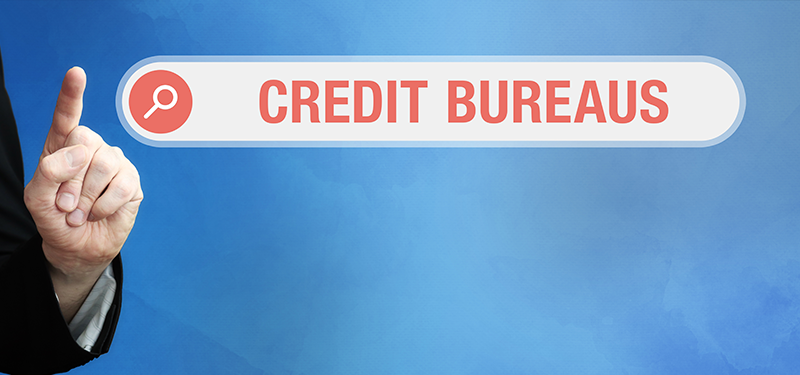What are the 3 credit bureaus

Who are the credit bureaus, and what do they actually do?
There are actually four agencies:
Experian
Equifax
TransUnion
Innovis
But really only the first three – Experian, Equifax and TransUnion – would most consumers have any interaction with.
For-profit companies:
One important thing to keep in mind, though they have potentially a profound impact on our economic lives the credit bureaus are not in any way a governmental agency. They are very much for-profit businesses. And the people whose credit histories are in their databases are not their consumers, they are actually the product that the credit bureaus sell. They make their money largely through the sale and use of consumers’ credit information. And selling consumer credit information is big business.
Last year the big three credit bureaus together made over $9 billion in revenue and have a combined market capitalization of $24 billion.
They are quite powerful businesses that are focused on what is in their best interest. According to the Center for Responsive Politics, last year the three major agencies spent nearly $3 million to lobby lawmakers to protect and further those interests.
They’re overseen by the FTC and Consumer Financial Protection Bureau regulate how consumer data can be sold to other companies. But when it comes to the protection of consumer data, like the data exposed in the Equifax breach, there is very little oversight. And given that lack of oversight, it took Equifax six weeks to announce the breach had happen, and they then left it up to consumers to determine if their data had been stolen.
The credit bureaus have an extremely pervasive influence on our lives. The data they house on us can effect whether we get a job or not, if we qualify for insurance and how much we’ll pay, and if we get credit for things like a home, car, or credit card. Whether we’re full aware of it or now, the credit bureaus are an important factor in our economic lives.
Along with some of the seemingly more ominous aspects of their role, they’re also, in some ways, at the center of an information market necessary in our economic lives. Their trade in consumer data is essential for consumers and businesses to transact when a purchase is made using credit. That marketplace of consumer data is an important factor in much of the economic activity in this country. If you think back less than 100 years ago, purchases almost always had to be made with cash. Credit was usually only extended to those the lender knew directly, and based their “reputation”.
How do they make money?
The credit bureaus have an unorthodox business model. Their customers, lending institutions, are providing the bureaus with the information they need about consumers for free, and then the bureaus sell that information back to those institutions for a fee.
The credit bureaus have five main ways of making money.
Credit Services
This is sort of their bread and butter, and the way most people think of the credit bureaus – selling consumer data to lenders, insurance companies and other businesses. This data is used by those businesses to assess the risk of extending credit or insurance to particular customers.
Analytic Services
Not only do the bureaus provide the raw credit history data of consumers to businesses, but they also do analysis that shows how consumers are likely to interact with certain types of debt. This helps potential lender with their decision making process on whether or not to extend credit. This service goes beyond just the historic data, and lenders pay more for it.
Marketing
Beyond those businesses looking to extend credit or not, marketers from all imaginable business sectors wish to use the customer data the credit bureaus possess to help better target potential customers. The “pre-approved” offers you receive in the mail are one use of this data. The businesses pay a marketing fee to the credit bureaus for customers who meet some predetermined requirement the marketer is using for targeting their product or service.
Another way the bureaus make money from marketers is to simply sell them your data. Usually the marketers will either add, or append, the additional data from the credit bureaus to data they have on their own customers in a database, or the marketers will use it for prospecting for new customers.
Consumer Services
Though the credit bureaus use consumer data to make money, they also sell that consumer credit data back to those same customers. Products like credit monitoring, identity theft and fraud prevention are packaged and sold directly to consumers for an additional source of revenue to the credit bureaus.
Credit Disputes
Finally, the credit bureaus actually make money whenever a consumer disputes an item on their credit report. The business that furnished the data in dispute actually has to pay the credit bureau a small fee each time. It’s not a lot, but looked at across all of the disputes lodged during the course of the year it does add up to a considerable amount.
How do the bureaus impact me?
Unlike other companies in our lives, like ATT and Verizon who we can switch from at any time, consumers don’t have a choice on which of the bureaus to have their credit information. In many ways the normal leverage consumers have to force companies be more responsive to their needs is gone when it comes to the credit bureaus. The one area where consumers can push back effectively and create change is in having inaccuracies removed from their credit reports.
In an FTC study approximately 25% of consumers had at least one error on their credit report. This can have a serious impact on your credit score and ability to obtain credit. Consumers have the right to dispute errors on their report and have them removed if they’re not legitimate. A dispute is something they can file themselves or have a professional credit repair firm handle on their behalf.
Consumers don’t have a great deal of control when it comes to the reporting of their credit history. But where they do in the case of error removal it’s important that they exercise their power.





